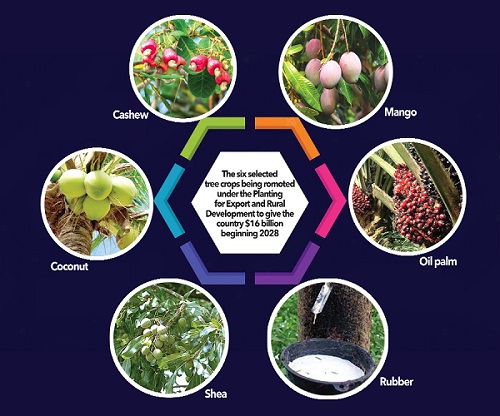
Diversifying cash crops: Tree Crops Development Authority launches five-year strategic plan
On September 29, 2020, President Nana Addo Dankwa Akufo-Addo inaugurated a 29-member Board of Directors of the Tree Crops Development Authority (TCDA), chaired by Stephen Sekyere-Abankwa, with a former Deputy Minister of Agriculture, William Quaitoo, as the Chief Executive of the authority.
Other members are a representative each from the Ministries of Food and Agriculture, Trade and Industry and Finance. Additionally, stakeholders in the selected tree crops have four directors each on the board to make up the 29-member board.
Advertisement
Responsibilities
The TCDA, with headquarters in Kumasi, has the responsibility to spearhead the diversification of the agricultural sector, with a focus on the development of tree crops and the consequential benefits to accrue to the country.
Started with six out of the seven tree crops being promoted under the Planting for Export and Rural Development (PERD) programme — cashew, oil palm, shea, coconut, mango and rubber, the TCDA is modelled along the lines of the Cocoa Marketing Board (COCOBOD).
Per its operation, the TCDA is positioning the country to earn about $16 billion annually from the six selected tree crops from 2028. This is to diversify the overreliance on cocoa as the major export commodity of the country, with an annual income of about $2.5 billion.
Game changer
It is surprising and unacceptable that 70 years after the establishment of COCOBOD, the country remains a mono-crop agricultural economy.
So, during the inauguration of the authority, President Akufo-Addo described it as a game-changer, stating that the selected crops had the potential to change the economy of the country and overtake cocoa as its major cash crop.
To actualise the expectation of the President, the TCDA last week launched a five-year strategic plan to nurture a competitive and sustainable tree crops industry.
The plan, covering a period of 2022 to 2027, is expected to rake in $12 billion annually from the six key tree crops.
The strategic plan will also serve as an investment framework to guide the mobilisation of both public and private investments for the development of a sustainable tree crops industry in the country.
TCDA developed the plan with technical assistance from the International Finance Corporation (IFC), the private sector lending arm of the World Bank Group, and funded by the Swiss State Secretariat for Economic Affairs (SECO).
Launch
Launching the plan in Accra, the Minister of Food and Agriculture, Dr Owusu Afriyie Akoto, explained that for more than a century, the country had relied on cocoa as a major cash crop and a source of foreign exchange earnings.
He said in spite of the abundance of arable land suitable for cocoa production, such a golden opportunity was under threat as a result of deforestation, climate change and other human-caused environmental destruction, adding: “As a result, the amount of land suitable for cocoa production has decreased significantly”.
Dr Akoto said the framework for the tree crops industry's transformation was an essential component of Ghana's inclusive economic transformation goal for long-term growth.
Golden opportunity
Describing the plan as a golden opportunity for stakeholders including development partners, Dr Akoto said it would efficiently align their resources and commitments for mutual accountability as they worked together to address the challenges within the tree crop industry.
“In comparison, over 1.6 million farm households cultivate tree crops other than cocoa.”
“So, the tree crop subsector is a great way to diversify the economy by creating more jobs, reducing poverty, making sure there is enough food, making money in foreign currencies, and adding to the Gross Domestic Product (GDP),” he said.
He added that while the county’s tree crop industry had enormous potential, it was faced with systemic challenges such as low productivity, poor quality produce, price volatility, limited access to finance and markets, and a sub-optimal regulatory environment, all of which contributed to a non-competitive and unsustainable industry hence the establishment of the authority.
Giving the operations of the framework, Mr Quaitoo explained that it was divided into four broad strategic focus areas with emphasis on support for adaptive research; production and value chain support; capacity-building support to value chain actors, and licensing and regulation.
He said the authority would continue to inspire innovation by investing in Research and Development to explore competitive and sustainable ways to create traceable tree crops supply chains and market systems.




